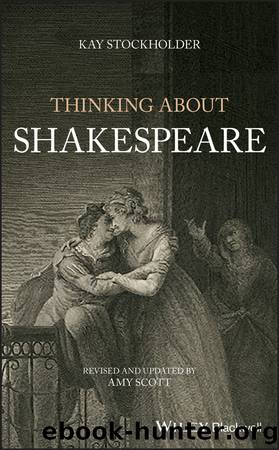Thinking About Shakespeare by Stockholder

Author:Stockholder [Stockholder, Kay]
Language: eng
Format: epub
ISBN: 9781119059042
Publisher: Wiley
Published: 2018-07-23T00:00:00+00:00
In the absence of any alternative view of her, when Troilus himself speaks of Helen in images that suggest her worthlessness, he belies his own argument that her value derives not from her, but from the value she acquires from those who fight for her. Therefore, though the question he raises has genuine philosophical import, his manner of argument undermines the seriousness of the question, the more so because the off‐stage audience knows what his on‐stage audience doesn’t – that he is covertly defending his choice of Cressida as a lover.
Thus is Troilus’s argument compromised (though his premise is not thereby invalidated), and one would expect that Hector’s view would command greater respect. However, no sooner has Troilus finished than Hector sets himself up as a kind of Aristotle lecturing to neophytes. He adopts some of the self‐inflating manner that we saw in the Greek camp, but he delivers a straightforward speech, based on what would be common sense for most people, to the effect that Helen was wrongly taken, and therefore should be returned to her people and her rightful husband. However, he undermines the status of reasonable argument as a basis for action when he unexpectedly does an about‐face and comes down on the side of keeping Helen because, “’tis a cause that hath no mean dependence / Upon our joint and several dignities” (2.2.192–3). Hector thus disperses the meaningfulness of the entire debate, and further undermines its import when he announces that he has already sent the Greeks the challenge that we have previously heard them receive. The implication is that he assumed before this council ever took place that they would keep Helen, and that the rest has been a rhetorical exercise or show. That Hector chooses the word “dependence” to defend his decision to keep her is telling. It speaks to the idea of “meeting” or coming together that both upheld and threatened Ulysses’ idea of order. If we were to make the mistake of thinking dependence of one person on another could be an intimate, valuable bond, the play here positions it as a negative state simply because it seems meaningless since Hector himself has already outlined valid and politically sound reasons for ending the war.
The play also stresses the prevalence and destructive power of trivial vanity. Vanity empties whatever it touches of stable meaning and fixed worth. This motif receives its culminating statement toward the end of the play when Hector, having refused to fight with Thersites as too base an adversary to give him honor, fights instead for the glittering armor of an unknown enemy. When he has defeated his adversary, he says, “[m]ost putrefièd core, so fair without, / Thy goodly armor thus hath cost thy life” (5.8.1–2). The image easily stands for the whole of the war, but takes on added irony when Achilles’ Myrmidons attack and kill the now unarmed Hector, who himself becomes the “putrefièd core,” who gave his life for glittering armor. The image of the glittering decay is a comment on the Trojans and Greeks alike.
Download
This site does not store any files on its server. We only index and link to content provided by other sites. Please contact the content providers to delete copyright contents if any and email us, we'll remove relevant links or contents immediately.
Still Me by Jojo Moyes(11265)
On the Yard (New York Review Books Classics) by Braly Malcolm(5525)
A Year in the Merde by Stephen Clarke(5430)
Eleanor Oliphant Is Completely Fine by Gail Honeyman(5282)
The Bookshop by Penelope Fitzgerald(3853)
How Music Works by David Byrne(3270)
Surprise Me by Kinsella Sophie(3113)
Pharaoh by Wilbur Smith(2993)
Why I Write by George Orwell(2953)
A Column of Fire by Ken Follett(2612)
Churchill by Paul Johnson(2584)
The Beach by Alex Garland(2560)
The Songlines by Bruce Chatwin(2555)
Aubrey–Maturin 02 - [1803-04] - Post Captain by Patrick O'Brian(2306)
Heartless by Mary Balogh(2259)
Elizabeth by Philippa Jones(2205)
Hitler by Ian Kershaw(2198)
Life of Elizabeth I by Alison Weir(2086)
Harry Potter and the Cursed Child by J. K. Rowling & John Tiffany & Jack Thorne(2062)
